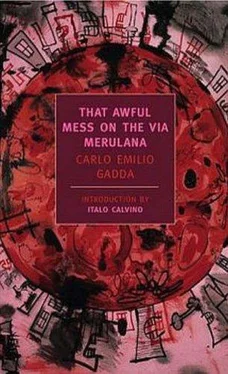Strange borborygms, under cover, contradicted the coma, and, more strangely, death: they gave the impression of a miraculous imminence: that the sheets and the blankets were on the point of bulging, swelling: of rising and floating in midair, on the paralyzed gravity of death. The old woman, Migliarini Veronica, was huddled in the chair, frozen in a commemoration of the ages that had, on the other hand, dissolved into non-memory: she had one of her hands in the other, resembling Cosimo pater patriae in the so-called portrait by Pontormo: dry, lizardy skin, on her face, and the wrinkled immobility of a fossil. There wasn't, in her lap, but she would have liked it, the earthenware brazier. She raised her eyes, gelatinous and glassy in their tan color, without interrogating any of those people who, to her, must have seemed shadows, neither the girl, nor the men. The spent quiet of her gaze was opposed to the event, like the mindless memory of the earth, from paleontological distances: alienating that face of a hundred-and-ninety-year-old Aztec woman from the acquisitions of the species, from the latest, quick-change artist's conquests of Italian eyeing.
A majolica pan, as if from a clinic of the first category, was set on the brick floor, and not even near the wall: and neither did it lack some undeciphered content, on the consistence, coloration, odor, viscosity and specific weight of which both the lynx eyes and the bloodhound scent of Ingravallo felt that it wasn't necessary to investigate and analyze: the nose, of course, could not exempt itself from its natural functioning, that is, from that activity, or to be more accurate, that papillary passivity which is proper to it, and which does not admit, helas, any interlude or inhibition or absence of any kind from its duty.
"Is this your father?" Don Ciccio asked Tina, looking at her, looking around, and then taking off his hat.
"Doctor, you see the state he's in. You wouldn't believe me: but now you've got to believe me, finally!" she exclaimed in a resentful tone, and with eyes which seemed to have wept, the beauty. "I've given up hope by now. It'd be better for him, and for me too, if he died. To suffer like that, and without any money or anything. His behind, if you'll pardon the word, is just one big sore, now: it's a mess, poor Papa!" She was trying, thought Ingravallo harshly, in her grief she was trying to turn her father to use, his direct decay. "And he even has a rubber bedpan," she sighed, "otherwise his bedsores would have been infected. This morning, at eight o'clock, he was in pain again, it hurt him bad, he said. He couldn't stay still ten minutes, you might say. Now he hasn't moved for three hours: he doesn't say a word: I have a feeling he's out of his suffering now, that he can't suffer any more": she dried her eyes, blew her little nose: "because he can't feel anything now, good or bad, poor Papa. . The priest can't get here before one, he sent word. Ah me, poor us!" she looked at Ingravallo, "if it hadn't been for the signora!" That remark sounded empty, distant. Liliana: it was a name. It seemed, to Don Ciccio, that the girl hesitated to evoke it.
"Of course," he said, wearily, "the bedpan!" and he remembered the unbosomings of Balducci, "I know, I know who gave it to you: and that jar, too," and he indicated it with his head, his chin, "and the blanket," he looked at the blanket on the bed, "you were given them by… by a person who promptly got paid back, for her goodness. Don't do good, if you don't want to receive evil, the proverb says. And that's how it is. Aren't you going to talk? Don't you remember?"
"Doctor? what should I remember?"
"Remember the person who helped you so much, when you deserved so little."
"Yes, the family where I worked: but why didn't I deserve it?"
"The family! Signora Liliana, you mean! who had her throat cut by a murderer!" and his eyes were such that, this time, Tina was frightened: "by a murderer," he repeated, "whose name," he spoke, curule, "whose full name we know!. . and where he lives: and what he does. ." The girl turned white, but didn't say a word.
"Out with his name! yelled Don Ciccio. "The police know this name already. If you tell it right now," his voice became deep, persuasive: "it's all to the good, for you."
"Doctor Ingravalli," repeated Tina to gain time, hesitating, "how can I say it, when I don't know anything?"
"You know too much, you liar," shouted Ingravallo again, his nose to hers. Di Pietrantonio was stunned. "Cough it up, that name, you've got here: or the corporal'll make you spill it, in the barracks, at Marino: Corporal Pestalozzi."
"No, sir, no, Doctor: it wasn't me!" the girl implored then, simulating, perhaps, and in part enjoying, a dutiful fear: the fear that whitens the face a little, but still resists all threats. A splendid vitality, in her, beside the moribund author of her days, which should have been splendid: an undaunted faith in the expressions of her flesh, which she seemed to hurl boldly to the offensive, in a prompt frown, with a scowl: "No, it wasn't me!" The incredible cry blocked the haunted man's fury. He didn't understand, then and there, what his spirit was on the point of understanding. That black, vertical fold above the two eyebrows of rage, in the pale white face of the girl, paralyzed him, prompted him to reflect: to repent, almost.
The name Remo (Remus) Gadda imagines as being disliked by the Fascists because of their cult of Romulus, founder of Rome. Eleuterio is the Italian translation of the Greek name which means "free." It's unlikely that many Fascists gave these names any thought.
The title "signorino," now disappearing from Italian usage, was given — usually by the women of the family — to unmarried men, young or old. The word, when used by Ingravallo, has a slightly contemptuous nuance.
The initials PV and BM — which will be encountered later on— are indications of various bus lines in the Rome of 1927.
One of the difficulties of the Countess' surname is that it is perilously close to several Italian obscenities, such as cazzo, caca.
Luigi Facta had been the ineffectual Prime Minister of Italy at the time of the March on Rome. Mussolini made him a Senator in 1924.
Margherita Sarfatti, one-time mistress of Mussolini and author of the fulsome biography, Dux.
Mussolini, in 1927, was also Foreign Minister. His offices were in Palazzo Chigi.
Faiti and Cengio are mountains where the Italian army fought bitterly and suffered severe losses in the First World War, and where Gadda's brother was killed. For a moment, here, Gadda identifies himself openly with Ingravallo and attributes his own bereavement to the fictional character.
Sgurgola is a small village not far from Rome, often used by Romans to indicate a backward locality, a place from which peasants come.
At a later date, Mussolini, with great bombast, was to ask the wives of Italv to sacrifice their gold wedding rings to the Fatherland.
A typical Gaddian private joke. Pope Pius XI was fond of blessing newlyweds, referring to them as sposi novelli ("fresh bridal pairs"); polli novelli is the characteristic Roman advertisement for fresh chickens. (Among Gadda's less well-known achievements is the construction, as engineer, of the Vatican Power Station for Pius XI. He also wrote the official description of it.)
Cola di Rienzo (1312-54), medieval revolutionary figure who was executed. The words "fat, he was" are a quotation from a contemporary chronicle.
Ferrania is a small city near Savona. Mussolini had planned an oil pipeline there. It was never built.
Reference to an Italian custom: recently married couples send sugared almonds in tulle bags to those who have sent — or should send — wedding presents.
Читать дальше












